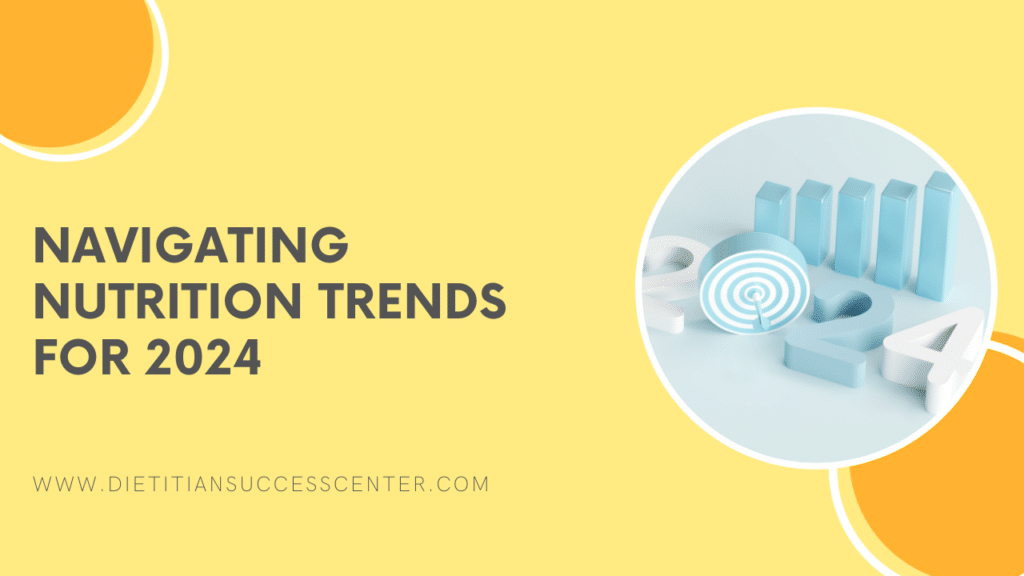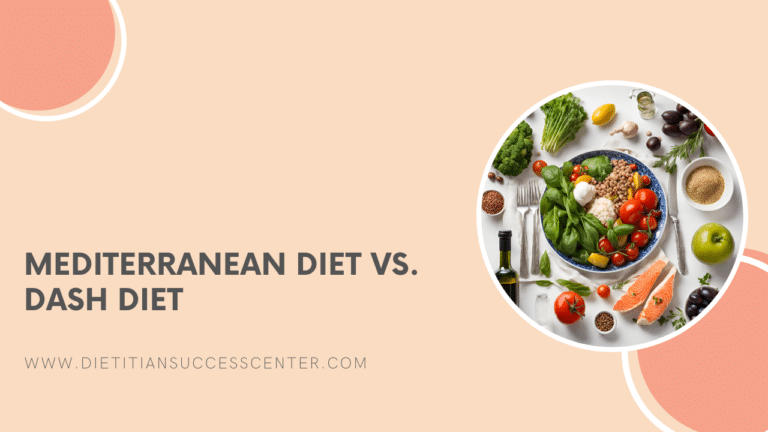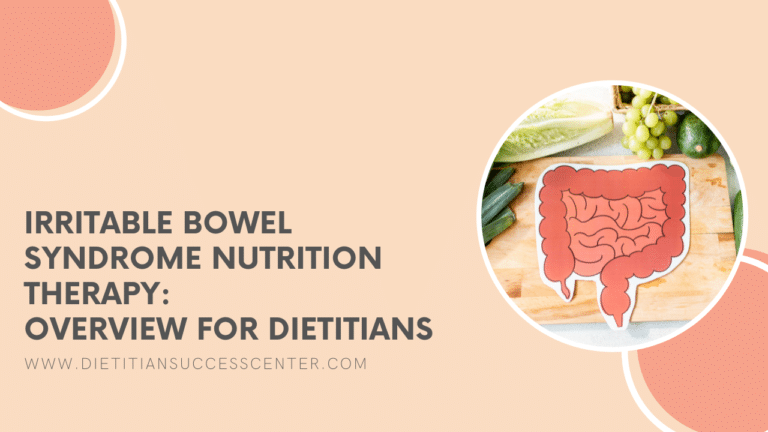

Written by Olivia Farrow, RD, MHSc
Reviewed by Maria Dellanina, RDN
Nutrition trends impact the food choices people make everyday. As dietitians and health professionals, it’s important to stay up to date with emerging nutrition trends to be able to navigate new evidence, adapt to cultural shifts, and engage with clients effectively.
We also want you to be at the forefront of nutritional knowledge. With DSC, you’re not just keeping up, but you’re ready to lead and share the information your clients are searching for.
This article will explore nutrition trends we expect to see in 2024. Nutrition is constantly changing and innovating, so read on to make sure you don’t get left in the dust!
Trend #1: Plant-based diets
What to know about plant-based diets
A plant-based diet is a broadly used term to describe eating patterns that emphasize fruits, vegetables, whole grains, legumes, nuts and seeds (1). Vegan, vegetarian, and flexitarian eating patterns all emphasize plant-based foods and may be considered examples of plant-based diets (1). However, some people reserve the term plant-based diets for vegan diets.
Plant-based diets offer a win-win scenario for human health and the environment. It is well known that eating more plant-based foods may reduce the risk of many diseases including diabetes, heart disease, and metabolic syndrome. Simultaneously, following an eating pattern that emphasizes plants while limiting animal products can reduce greenhouse gas emissions and water use (2).
Here’s why you should stay on top of this topic:
Plant-based diets have been trending for a number of years but many individuals may prioritize taste when it comes to plant-based options (3). Not all plant-based diets can meet nutritional needs. Meeting nutrient requirements on exclusively plant-based diets may take additional guidance and education to obtain B12, protein, iron, etc. Nutrition professionals can support clients in making nutritious plant-based choices that fit with their individual health and nutrition needs.
Learn more about plant-based diets in DSC’s Plant-Based Eating video course & toolkit.
Trend #2: Sustainable Eating
What to know about sustainable eating
Sustainable eating shares many elements with plant-based diets while also incorporating elements of food production.
According to the Food and Agriculture Organization (FAO), sustainable diets encompass not only nutritional and environmental aspects, but also economic and socio-cultural dimensions (4). The FAO’s definition of sustainable diets are those that have low environmental impacts, promote food and nutrition security, support healthy living for present and future generations, protect biodiversity and ecosystems, are culturally acceptable, economically fair and affordable, and optimize natural and human resources. Promoting sustainable diets to clients can not only promote health now but also offer benefits for future generations (5).The EAT-Lancet Commission notes the production of fruits, vegetables, nuts and legumes will need to more than double to meet global needs by 2050 due to increasing population size (2).
Here’s why you should stay on top of this topic
As a nutrition professional, you can help your clients understand how sustainable eating can not only promote their health now but also contribute to a healthier future for generations to come (5). By integrating the principles of sustainable eating into your guidance, you empower clients to make choices that align with their health goals while also supporting broader environmental and societal well-being. You can also help clients to make nutritious choices that align with their values surrounding issues like food waste, animal welfare, food packaging waste, etc.
DSC’s resources can help you to support clients in creating realistic meal plans that minimize food waste, choosing foods with lower greenhouse gas emissions and understanding what can make a plant-based diet sustainable.
Trend #3: Mental Health and Cognition
What to know about mental health and cognition
In 2024, mental health and cognition are emerging as crucial factors in the realm of nutrition (3). The connection between diet and mental well-being is gaining attention. As awareness grows, clients may seek guidance on nutrition strategies to support mental well-being.
Certain nutrients and dietary patterns, such as omega-3 fatty acids, antioxidants, and the Mediterranean and MIND dietary patterns, have been linked to cognitive function and mental health. As a nutrition professional, staying informed about these connections and incorporating mental health considerations into dietary advice can enhance the overall well-being of your clients.
Here’s why you should stay on top of this topic:
The connection between nutrition and mental health is gaining attention. As a nutrition professional, you can offer valuable insights to clients on how certain nutrients impact mood, cognitive function, and overall mental well-being. By incorporating mental health considerations into your practice, you contribute to a holistic approach to health, helping clients optimize both their physical and mental wellness through well-informed nutritional choices.
Learn more about mental health and nutrition in DSC’s Mental Health Nutrition video course & toolkit.
Trend #4: Wellness Drinks
What to know about wellness drinks
Wellness drinks are gaining popularity as people look for convenient and functional beverages that offer health benefits (3). From herbal teas and functional waters to portable smoothie blenders, the market for wellness drinks is diverse and evolving.
Consumers are seeking beverages as a simplified way of supporting their nutrition and wellness goals. As a nutrition professional, exploring the nutritional content of various wellness drinks and understanding their potential impact on health can be valuable in guiding your clients toward healthier beverage choices.
Here’s why you should stay on top of this topic:
Understanding the nutritional content of various wellness drinks allows you to educate clients about the benefits and drawbacks of different options. This knowledge empowers clients to make informed decisions, ensuring that their beverage choices contribute positively to their overall well-being.
You can learn more about the current evidence on herbal supplements that will often appear in wellness beverages in DSC’s Herbal Supplements Reference Chart.
Trend #5: Protein Fortified Foods
What to know about protein fortified foods
Protein continues to be a focal point in the nutrition landscape, and protein-fortified foods are gaining traction (3). From fortified snacks to protein-enriched staples, individuals are increasingly looking for convenient ways to meet their protein needs.
Here’s why you should stay on top of this topic:
Protein plays a vital role in muscle maintenance, immune function, and overall health. As the market for protein-fortified foods expands, staying informed ensures that you can address your clients’ protein-related concerns effectively. By understanding the nutritional profiles of different sources of protein, you can provide tailored advice that aligns with your clients’ dietary preferences and requirements.
Check out these DSC’s protein resources to get started:
-
- Food Sources of Protein Client Handout (lists protein content of common foods)
Trend #6: AI and Social Media Influenced-Eating
What to know about AI and social media influenced-eating
In the era of technology, AI and social media are shaping dietary choices and eating behaviors. From AI-produced nutrition recommendations and AI nutrition apps, to the influence of social media trends on food preferences (recall “girl dinner,” protein coffee, and apparently cottage cheese made a big comeback in 2023?), the intersection of technology and nutrition is becoming more pronounced.
Here’s why you should stay on top of this topic:
In the digital age, AI and social media play a significant role in shaping dietary choices. As a dietitian, staying informed about how AI algorithms analyze personal data and how social media trends influence food choices allows you to guide clients through the complexities of technology-driven dietary trends. This knowledge ensures that your advice is not only evidence-based but also relevant in the context of today’s digital landscape.
Learn more about AI Nutrition Apps here.
Trend #7: Personalized Nutrition
What to know about personalized nutrition
Personalized nutrition, fueled by bio data, genetic testing, digital data trackers, and continuous glucose monitoring (CGM), is gaining prominence. The idea of tailoring dietary recommendations based on individual characteristics and responses is revolutionizing the field of nutrition.
As a nutrition professional, staying updated on the latest advancements in personalized nutrition allows you to offer more targeted and effective guidance to your clients, especially if they are curious about it! From understanding genetic predispositions to interpreting real-time data from digital trackers, personalized nutrition opens up new possibilities for optimizing individual health.
Here’s why you should stay on top of this topic:
Though we would argue that dietitians were providing personalized nutrition “before it was cool,” the emergence of personalized nutrition provides dietitians with an opportunity to offer more advanced guidance. By staying updated on the latest advancements in personalized nutrition, you can tailor your advice to consider the unique needs, preferences, and responses of each client. This personalized approach enhances the effectiveness of your guidance, leading to more positive outcomes for your clients.
Learn more about continuous glucose monitoring for non-diabetics here.
Trend #8: Affordable Nutrition and Food Budgeting
What to know about affordable nutrition and food budgeting
In a world where economic considerations impact dietary choices and food is becoming more expensive, affordable nutrition and food budgeting are gaining significance. Clients are seeking practical guidance on how to make nutritious choices within budget constraints.
Understanding cost-effective yet nutritious food options, meal planning strategies, and budget-friendly cooking techniques positions you as a valuable resource for clients navigating financial challenges. This trend emphasizes the importance of making health-conscious choices accessible to individuals across diverse cultural and socioeconomic backgrounds.
Here’s why you should stay on top of this topic:
Promoting affordable nutrition aligns with the broader goal of improving public health. By equipping yourself with knowledge on budget-friendly nutrition, you can empower clients to make financially-sustainable choices that positively impact their well-being without compromising financial constraints (or wasting their money on non-evidence based nutrition products).
Read more about the Current State of Food Shortages and Grocery Price Inflation here.
Find many of DSC’s Eating on a Budget resources here.
What Now?
The landscape of nutrition in 2024 is dynamic and diverse. From wellness drinks to personalized nutrition, staying ahead of these trends not only enhances your professional expertise but also positions you as a trusted source of guidance for clients seeking optimal health in an ever-evolving world.
With your DSC membership, you can stay on top of nutrition trends, adapt your approach, and stay client-centered.
References
1. Storz MA. What makes a plant-based diet? A review of current concepts and proposal for a standardized plant-based dietary intervention checklist. Eur J Clin Nutr. 2022;76(6):Article 6. doi:10.1038/s41430-021-01023-z
2. EAT-Lancet Commission. Food Planet Health. 2019. Available from: https://eatforum.org/content/uploads/2019/07/EAT-Lancet_Commission_Summary_Report.pdf
3. Kerry Health and Nutrition Institute. Ten Key Health and Nutrition Trends 2024. 2024. Available from: https://khni.kerry.com/trends-and-insights/ten-key-health-and-nutrition-trends-of-this-year/
4. Dietary guidelines and sustainability. Food and Agriculture Organization of the United Nations. [cited 2023 Dec 14]. Available from: http://www.fao.org/nutrition/education/food-dietary-guidelines/background/sustainable-dietary-guidelines/en/
5. Carlsson L, Seed B, Yeudall F. The Role of Dietitians in Sustainable Food Systems and Sustainable Diets. Dietitians of Canada. 2020.
Disclaimer: The information provided in all video content is for educational purposes only and is in no way medical or professional advice. Dietitian Success Center Inc. is not responsible and cannot be held liable for any actions or inactions taken related to the information provided. It is the user’s responsibility to validate content with their country’s current standards for dietetic practice before implementing.








